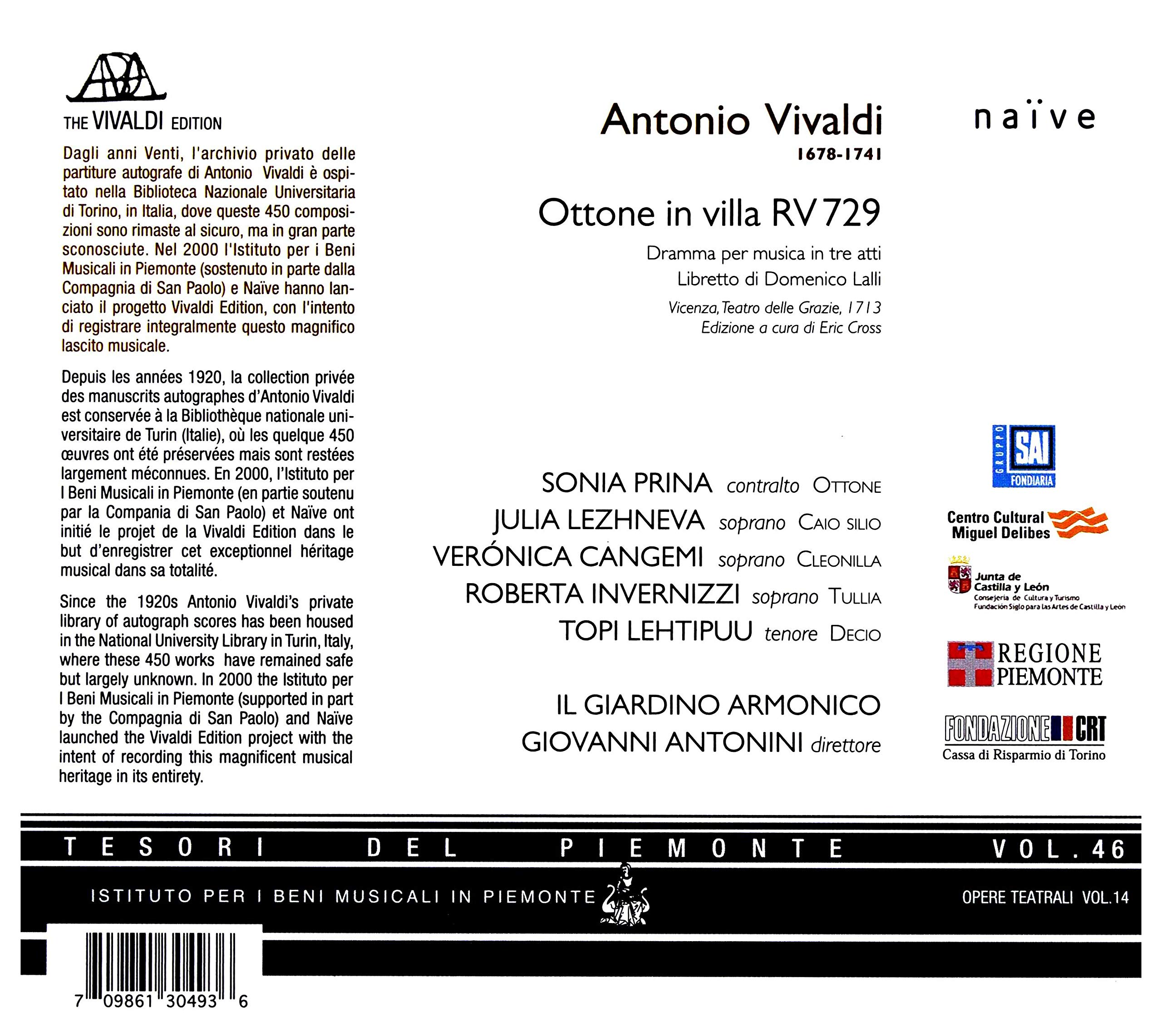Customer Services
Copyright © 2025 Desertcart Holdings Limited



After listening recently to a couple of Vivaldi operas and learning of the complexities surrounding their recording (specifically, Orlando 1714 and Motezuma) it is a great relief to be able to deal with one work that has not needed wholesale restoration. As well as being Vivaldi's first official operatic composition, Ottone in villa is one of the least problematic. Its score is (relatively) undisturbed and unambiguous. The opera itself, meanwhile, is succinct, colourful and rewarding. And, of course, being the 'first', it does not recycle material from previous operas. ( on-line review)
T**Y
Five Stars
I am happy with any Vivaldi Opera.
J**S
A delight
After listening recently to a couple of Vivaldi operas and learning of the complexities surrounding their recording (specifically, Orlando 1714 and Motezuma) it is a great relief to be able to deal with one work that has not needed wholesale restoration. As well as being Vivaldi's first official operatic composition, Ottone in villa is one of the least problematic. Its score is (relatively) undisturbed and unambiguous. The opera itself, meanwhile, is succinct, colourful and rewarding. And, of course, being the 'first', it does not recycle material from previous operas. (Attentive listeners will, however, recognise themes from the Oboe Concerto in C RV447 and Laudate pueri in c RV600.)This particular recording, by Antonini and Il Giardino Armonico, is more imaginative and arresting than the only other one I've heard (on the Chandos label) and has a lightness of touch that is entirely appropriate for the score. It also benefits from having a booklet which is very much up-to-date with recent research. A couple of years ago, I read an article (in Studi Vivaldiani) which suggested that Vivaldi was already composing operas under another composer's name by 1705. It is a fascinating detail explored in the booklet's introduction. If it's true that Vivaldi had been composing operatic material a decade or so before the appearance of Ottone, it explains why his 'debut' opera bears all the marks of maturity - as with Beethoven's piano sonatas, where even the Opus 2 set emerge fully-fledged. Frédéric Delaméa is surely right when he describes Ottone as 'a tyro effort which at once proclaims the master'. (Incidentally, vivaldians might care to know that it's very much easier to subscribe to Studi Vivaldiani in the US than it is in the UK, where subscription is declined even when offering to pay in Euros! There's even a subscripton link on the appropriate page of Amazon.com over in the States.)An entirely satisfying opera is matched by an equally satisfying performance. This, the earliest of Vivaldi's operas (according to current knowledge, at least), is 'orchestral' in its colours and inspiration. One of the delights of this recording is its use of a wide range of instrumental colour. Particularly effective here are the innovative use of a harp as one of the continuo instruments, and the sopranino recorder, which enhances the breezy and bucolic atmosphere of the aria, Io sembro appunto, in Act II. Variety of texture is another feature. A solo violin accompanies the soprano aria, Guarda in quest'occhi, in Act III, and quite possibly recreates Vivaldi's own role during the opera's premiere in Vicenza on 17 May, 1713. Full marks to Naive yet again for an assured addition to their increasingly impressive catalogue.
R**B
Lezhneva is a disappointment...
Very stylish performance. All singers are more or less adequate except Lezhneva. Her voice is not focused and not clear. She is also not fully in control of it. Moreover, Lezhneva make no attempt to give sense to music she performs...Antonini directs "Il Giardino Armonico" in very soft manner, which maybe lacks drive of Spinosi or Alessandrini recordings, but is full of inner energy and sense. This make one listen it over and over again each time discovering new nuances in music.
C**B
Surprising!
I'm a fan of Vivaldi's orchestral and choral works and have not heard many of his "dramma per musica". This CD is a delightful surprise. From the outset he sets the tone that every note, breath, and movement have a deep meaning to each character or situation. It's not just an early-ish opera that bores you... the music is interesting, providing flourishes and varying dynamics to bring you into the character's mindset. You can't go wrong with Vivaldi!
Trustpilot
1 month ago
2 weeks ago